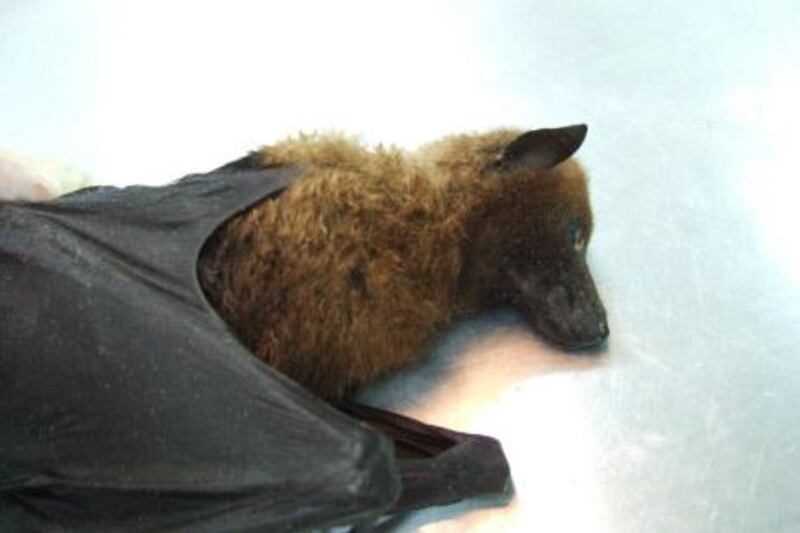DUBAI // A colony of imported Indian fruit bats has been destroyed after veterinarians found a highly infectious strain of rabies.
The 12 animals were imported by a private collector into the emirates but were euthanised after being found to have been passive carriers of the disease.
It is one of the first instances of rabies in the country since 1992, when dozens of animals, including 31 camels, died.
The experts who discovered the virus in the bats at the Central Veterinary Research Laboratory have issued a warning over bringing similar animals into the UAE in the future.
"It's a significant risk for both the handlers of these animals and the vets who treat them," said Dr Ulrich Wernery, the laboratory's director. "They can transmit the virus to other animals and humans."
The presence of rabies in bats is well documented. In 2002, Scottish conservationist David McRae died from rabies after being bitten by a bat.
Although fruit bats do not consume blood, they can sometimes bite if they are handled. The rabies bite is often transmitted through the saliva of the infected animals.
"The risk is only small, but it's important people know about it and are aware of it," said Dr Wernery.
The animals did not show any signs of the virus when they were imported into the country. Dr Wernery said that many types of bat have the virus but are immune to it, which makes it impossible to screen them.
"These animals have an immunity, so they don't show symptoms," he said. "It's impossible to test them for the virus when you import them. You need to kill them first to examine their brains."
The virus was discovered when three of the animals became ill and died of a separate, undisclosed disease. Rabies was detected as part of a routine examination.
A warning was sent to the owner and the animals were euthanised. The handlers and other animals were vaccinated.
"The whole story is over now," said Dr Wernery. "It's important for the future that people don't import these kinds of animals."
The animals were apparently imported by a zoo, although Dr Wernery declined to say which one.
There are believed to be no other imported fruit bats in the country. The UAE has however a sizeable community of bats in the wild, including the Egyptian fruit bat, which sometimes roosts in date plantations.
Despite that, the numbers are unclear because there have been no in depth studies of the animals. Dr Wernery said because of the lack of information about them, it was unclear whether fruit bats or any other species of wild bats in the UAE carries rabies.
"At present, we don't know anything about them," he said. "It would be very interesting to see if the bats carry the virus here as well."
He said that the centre would be willing to carry out tests in future, should a specimen be captured.
Dr Drew Gardner, an academic who has studied bats in the emirates extensively, said that it was conceivable that the animals carried viruses, but added that the risk of infection was very low.
"Generally in the UAE there is little interaction between bats and humans and the likelihood of cross infection of any disease is very low," he said.
"I think that what is perhaps needed is a reminder that wild animals in general, and certainly bats, need to be treated with respect and there needs to be an awareness that handling wild animals should be avoided."
mcroucher@thenational.ae





